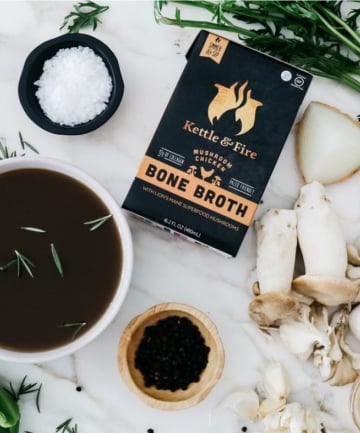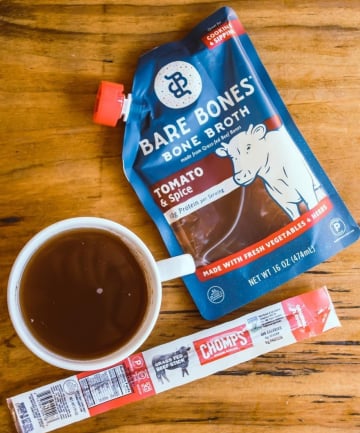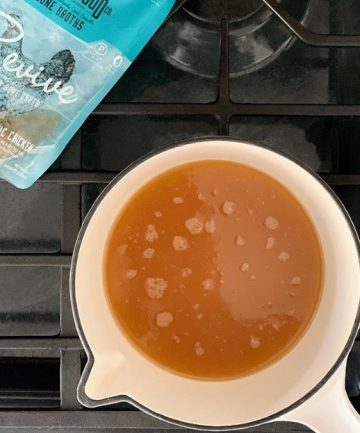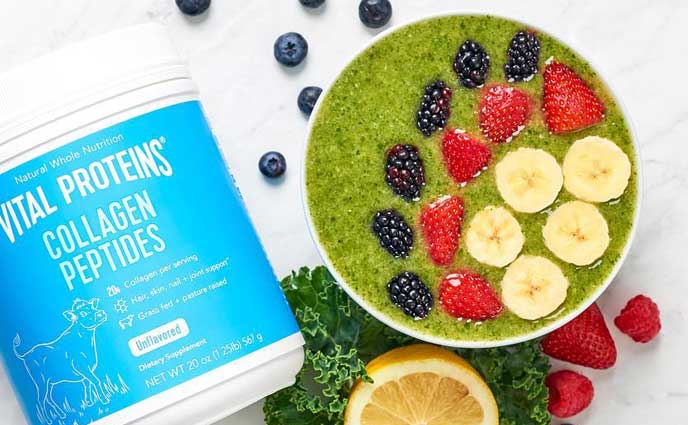Shacter says that there is evidence that components found in bone broth (e.g. glycosaminoglycans such as keratan sulfate, dermatan sulfate, chondroitin sulfate and hyaluronic acid) can support collagen production, improve skin elasticity and hydration, and protect against UV-induced skin damage.
Beauty Benefits: Collagen Support
Furthermore, Whittel says that bone broth can support the health of collagen structures throughout the body, including skin and joints. This is key because collagen is the most abundant protein in the body. It's about one-third of the body's protein. However, collagen levels begin decreasing in our 20s at about one percent every year. Eeep. Collagen present in bone broth aids in hydration and helps maintain a youthful appearance as we age.
Beauty Benefits: Stronger Hair and Nails
The amino acids found in gelatin help with collagen production which results in stronger hair, nails and improved skin elasticity, according to Whittel. During her travels to China, Whittel learned that one of the health and beauty secrets of the women with flawless skin and thick, lustrous hair was eating parts of animals that provided a boost of collagen, protein and minerals, like chicken feet.
Image via Imaxtree
Beauty Benefits: Collagen Support
Furthermore, Whittel says that bone broth can support the health of collagen structures throughout the body, including skin and joints. This is key because collagen is the most abundant protein in the body. It's about one-third of the body's protein. However, collagen levels begin decreasing in our 20s at about one percent every year. Eeep. Collagen present in bone broth aids in hydration and helps maintain a youthful appearance as we age.
Beauty Benefits: Stronger Hair and Nails
The amino acids found in gelatin help with collagen production which results in stronger hair, nails and improved skin elasticity, according to Whittel. During her travels to China, Whittel learned that one of the health and beauty secrets of the women with flawless skin and thick, lustrous hair was eating parts of animals that provided a boost of collagen, protein and minerals, like chicken feet.
Image via Imaxtree
Amino-rich gelatin (aka cooked collagen) plays a healing role in the body by improving the gut lining and supporting the digestive and immune systems, says Whittel. This helps reduce inflammation within the body that can negatively impact our outer appearance, such as with rashes or redness. It's something Whittel has personal experience with. "I have suffered from inflammation in my body (eczema) since I was child," she says. "So, bone broth is actually a staple in my diet to help manage inflammation. I like to drink one to two cups daily."
Image via Imaxtree
Image via Imaxtree
It's not just about the exterior: There are numerous internal benefits to ingesting bone broth that can contribute to a healthier body, inside and out.
Collagen is more than just a trendy beauty supplement — it's also great for the rest of your body, thanks to all its amino acids. For example, the amino acids glycine and glutamine are involved in the production of glutathione which is a powerful antioxidant that supports liver detoxification. Plus, the amino acids are essential to healthy skin.
Health Benefits: Nutrient Absorption
Whittel says that beyond collagen, bone broth is helpful for digestion and intestinal health. Glutamine is the fuel of choice for enterocytes (aka cells that line the intestinal lumen). Healthy enterocytes mean good absorption of nutrients from food, which can improve the health of the whole body.
Health Benefits: Structure and Muscle Relaxation
The various minerals in bone broth aid in hydration plus they act as enzymatic cofactors, reports Whittel. Some of their roles include providing structure (e.g. with bones) and helping to contract and relax muscles.
Image via @kettleandfire
Collagen is more than just a trendy beauty supplement — it's also great for the rest of your body, thanks to all its amino acids. For example, the amino acids glycine and glutamine are involved in the production of glutathione which is a powerful antioxidant that supports liver detoxification. Plus, the amino acids are essential to healthy skin.
Health Benefits: Nutrient Absorption
Whittel says that beyond collagen, bone broth is helpful for digestion and intestinal health. Glutamine is the fuel of choice for enterocytes (aka cells that line the intestinal lumen). Healthy enterocytes mean good absorption of nutrients from food, which can improve the health of the whole body.
Health Benefits: Structure and Muscle Relaxation
The various minerals in bone broth aid in hydration plus they act as enzymatic cofactors, reports Whittel. Some of their roles include providing structure (e.g. with bones) and helping to contract and relax muscles.
Image via @kettleandfire
Convinced? Here's everything else you need to know about bone broth, starting with the familiar homemade versus store-bought debate.
Prepackaged versus homemade bone broth depends on a few factors. They include length of cooking time, quantity and quality of bones used and the addition of any acid (e.g. apple cider vinegar).
Scan the ingredient list in store-bought broths. Shacter says that the only ingredients should be: bones, water, salt, vegetables, herbs, spices and apple cider vinegar. Watch out for anything with yeast extract, hydrolyzed yeast, autolyzed yeast, and/or flavoring. She says that these products aren't the real deal. Whittel advises that those who opt for store-bought bone broths select organic options, if possible.
According to Shacter, it's always suggested to choose organic pasture-raised sources for bones in hopes that they will contain less toxic residues such as heavy metals. She points out that some articles say to stay away from bone broth due to heavy metals, but research does not really support that. One research study on the amount of heavy metals in bone broth showed it contained less than five percent of daily recommended levels per serving.
Image via @barebonesbroth
Prepackaged versus homemade bone broth depends on a few factors. They include length of cooking time, quantity and quality of bones used and the addition of any acid (e.g. apple cider vinegar).
Scan the ingredient list in store-bought broths. Shacter says that the only ingredients should be: bones, water, salt, vegetables, herbs, spices and apple cider vinegar. Watch out for anything with yeast extract, hydrolyzed yeast, autolyzed yeast, and/or flavoring. She says that these products aren't the real deal. Whittel advises that those who opt for store-bought bone broths select organic options, if possible.
According to Shacter, it's always suggested to choose organic pasture-raised sources for bones in hopes that they will contain less toxic residues such as heavy metals. She points out that some articles say to stay away from bone broth due to heavy metals, but research does not really support that. One research study on the amount of heavy metals in bone broth showed it contained less than five percent of daily recommended levels per serving.
Image via @barebonesbroth
Whittel says that making bone broth is a rewarding experience. And it can be cost-effective as well. Furthermore, there are a variety of ways to make it. Both experts prefer an easier approach of saving leftover bones from an organic, pasture-raised roasted chicken. "I'm less concerned with how exactly the bone broth is made and more concerned with the quality of the meat and bones that are going into making the broth," says Whittel. "As with anything we eat, quality matters. Be sure to select wild or organic, pasture-raised, free-range, antibiotic and hormone-free meat and bones whenever you can." Using a Crockpot to make the broth allows for a low-maintenance approach, as Whittel's recipe highlights.
Image via @osso_good_bones
Image via @osso_good_bones









